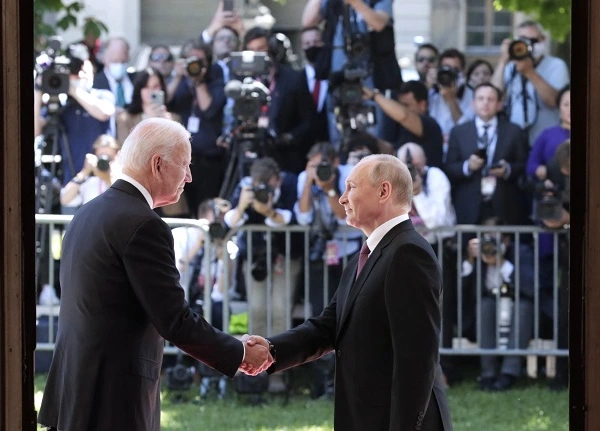Even as they announced a series of joint discussions, which will take place from Geneva to Brussels and Vienna in the next two weeks, Russia and the United States today warned each other amid escalating tensions over Ukraine.
In a 50-minute call, which the White House said took place "at the government of Russia's request", US President Joe Biden told his Russian counterpart Vladimir Putin that the United States and its allies and partners "will respond decisively" – including adopting "large-scale" sanctions – if Russia "further invades" Ukraine.
The Russian side gave an "exhaustive answer" to the option, saying that any such move from Washington would be a "grave mistake" and will be "threatening a complete rupture of Russian-American relations".
The White House said that the tone of the conversation between the two presidents was "serious and substantive" and they each framed their positions as they've done in previous calls and also publicly.
After the call, a senior US administration official revealed that Biden laid out two paths during the call with Putin. The first, he said, was a path of diplomacy leading towards the de-escalation of the situation. The other, added the official, is a path that's more focused on deterrence, including serious costs and consequences should Russia choose to proceed with a further invasion of Ukraine.
"And those costs include economic costs, include adjustments and augmentations of NATO force posture in Allied countries, and include additional assistance to Ukraine to enable it to further defend itself and its territory, as we've laid out previously," said the official.

Putin, on the other hand, gave detailed explanations of the principled approaches underlying the Russian drafts of the Treaty between the two countries and Moscow's agreement with the member states of the North Atlantic Treaty Organisation (NATO).
"It was emphasised that the result of joint work should be firm legal guarantees excluding NATO's eastward advance and the deployment of threatening weapons systems in the immediate vicinity of Russian borders… The security of each country can be ensured only on the basis of strict adherence to the principle of the indivisibility of security," said the Russian President's office.
Both Presidents, while exchanging New Year's greetings, also mentioned their special responsibility for ensuring stability in Europe and the world as a whole.
The two sides expressed mutual readiness for a serious and meaningful dialogue, starting with talks in Geneva on January 9-10 and then within the framework of the NATO-Russia Council in Brussels on January 12. On January 13, discussions will begin in the Vienna-based Organisation for Security and Cooperation in Europe (OSCE).
"President Biden reiterated that substantive progress in these dialogues can occur only in an environment of de-escalation rather than escalation," said the White House Press Secretary Jen Psaki in a statement after the phone call between the two Presidents.
The Geneva talks will be held in the format of interdepartmental delegations between Russia's Deputy Foreign Minister Sergey Ryabkov and the US Deputy Secretary of State Wendy Sherman.
"During the talks, we will seek from the US firm legal guarantees of the security of the Russian Federation, specifically NATO's non-expansion to the east and non-deployment of arms systems threatening Russia on the borders of our country," Russia's Foreign Ministry Spokeswoman Maria Zakharova had said on Thursday.
Washington, meanwhile, has engaged in extensive diplomacy all this while with Biden speaking with leaders across Europe and the Secretary of State Antony Blinken meeting with his counterparts at the G7, NATO and the OSCE ministerial meetings earlier this month.

Blinken had also dialled Ukrainian President Volodymyr Zelenskyy on December 29, reiterating the United States' "unwavering support" for Ukraine's independence, sovereignty, and territorial integrity "in the face of Russia's military buildup" on Ukraine's borders.
Russia's Foreign Minister Sergey Lavrov too has held several discussions with his counterparts, saying that the NATO member states are "systematically transforming Ukraine into a military foothold against Russia" by building their bases there and using its territory for conducting exercises.
"I would like to note: we will not allow our initiatives to be 'rolled up' in endless discussions. If a constructive response does not follow within a reasonable time and the West continues its aggressive line, then Russia will be forced to take all necessary measures to ensure a strategic balance and eliminate unacceptable threats to our security," Lavrov told state-owned domestic news agency RIA Novosti today.




















